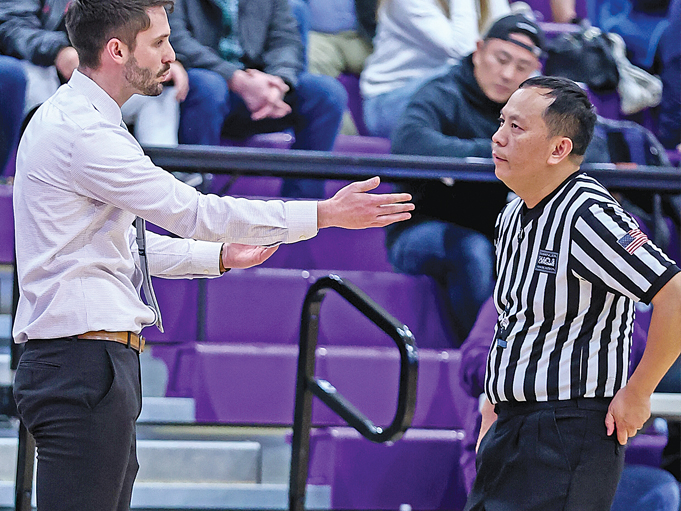In today’s society, too many people in the workplace have forgotten why they go to work. For most, it seems, the paycheck is the only reason to get up in the morning. Passion for their profession and the end goal of a job well done seem to be ideals that have faded over time.
All too often we see officials who have a negative attitude appearing on the field or court. Many articles have been written concerning the reasons why we officiate. Most officials will tell you they do so for the love of the game, but when we watch some of them work, that attitude is not what is seen.
In our daily lives, we are often the consumer or receiver of others’ attitudes. When we enter a business, don’t we expect to be treated like we are the most important person in the building? Don’t we want our friends to make us feel welcome and happy that we visited their home? When we arrive to officiate a game, don’t we want to be treated like they are glad we came?
All of those questions can be tied together in a simple phrase: customer service. That is one of the most important attitudes we can bring to our assignments. It is assumed we all know the rules and mechanics. There are several procedures to let coaches, players and game management know they are our clients and deserve to be treated as such. After all, without those “customers” we would not be needed.
Here are some mantras for keeping things in perspective.
Appearance
That means both how you look and how you act. Arrive early. Look neat and presentable. If you have facial hair, have it trimmed neatly. Otherwise be clean-shaven. You don’t need to show up in a three-piece suit; at least don’t look like you just got out of bed.
Have clean, unwrinkled uniforms that fit properly. Polish your shoes. You’d be surprised how often coaches notice seemingly small details such as your shoes. Most importantly, we represent the community of officials every time we put on the uniform. Our actions dictate how the next officials will be perceived.
Courtesy
Greet the people who invited you into their building. Thank them for the opportunity to do what you love. That includes game management, ticket takers and concession workers. Show them with your actions you are thankful for their efforts.
Do not expect free food. We wouldn’t like it if we invited someone to our house for dinner and they brought extra people without letting us know in advance. By the same token, don’t expect your friend or spouse will get into the game for free. If you have a guest attending the event with you, let game management know in advance. Most likely they will put your guest on the pass list, but be prepared to pay the admission.
Professionalism
We have a job to do. Whether it is a youth, high school, college or pro game, regardless of the teams’ records, we should strive to be the best at what we do. We made a commitment when we accepted the game. We agreed to show up early, prepared to call a good game and leave our personal issues outside the gym or field.
No matter how we feel emotionally, we need to remember the players and coaches worked hard to prepare for that game. It is the most important game of the season every time they play. They deserve our best effort at all times.
Service
Remember, we are there to officiate the game impartially. Fans come to watch the players. They are going to disagree with calls from time to time. That’s OK, as long as their comments aren’t overly abusive or personal. It is part of the game. Let game management handle unruly fans.
We are there to serve the game, not have the game serve us. Respect is a two-way street. Respect the coaches, fans, players and the game. Do not act superior or talk down to anyone. Treat everyone as you would want to be treated.
Communicate calmly with coaches and players. There is no need to be over officious. Call what needs to be called.
Use preventive officiating techniques to prevent minor rule violations. That is especially true at the lower levels. Sure, we can call a foul or violation on almost every play. But is it good for the flow of the game? Better to warn players and help them learn instead of overzealously calling fouls and violations.
Attitude
Act like you want to be there. Too many officials try to hurry games along. Pace of play is important, but speed is not. If you are in a hurry to get the game done, collect your paycheck and go on to something else, it will show in your performance. If you are in a hurry because you are thinking of another engagement or just want to go home, you will not be focused on the game and might miss a crucial call. Slow down, let the plays develop and — most importantly — have fun.
When we treat everyone with great customer service, we will be treated well and be invited back. Act like you are only there for the money and it may be the last paycheck you receive from that school.
What's Your Call? Leave a Comment:
Note: This article is archival in nature. Rules, interpretations, mechanics, philosophies and other information may or may not be correct for the current year.
This article is the copyright of ©Referee Enterprises, Inc., and may not be republished in whole or in part online, in print or in any capacity without expressed written permission from Referee. The article is made available for educational use by individuals.















